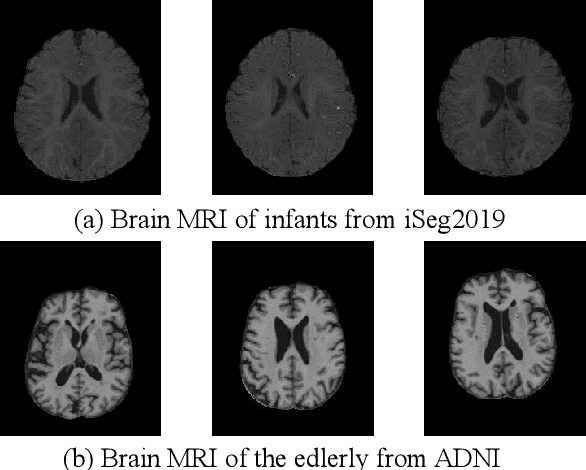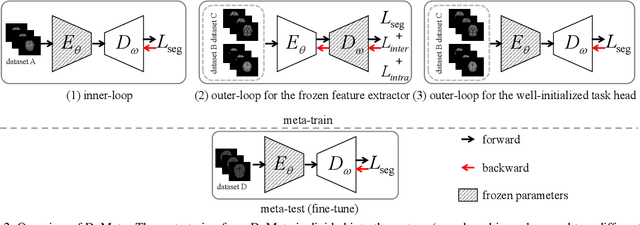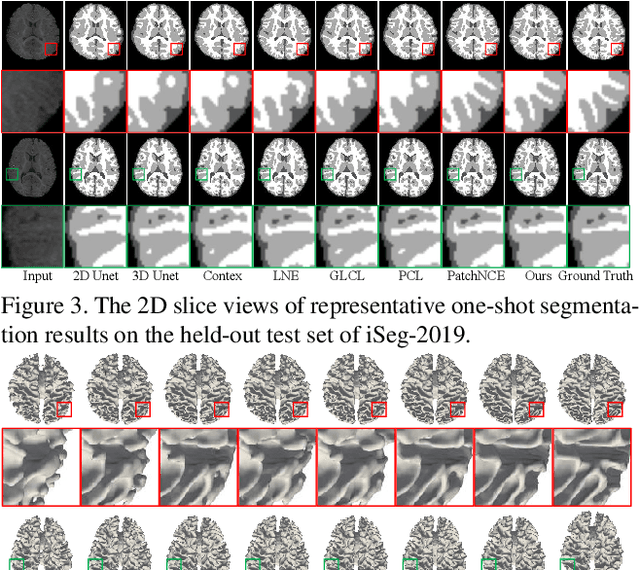Yongheng Sun
Unified Multi-Site Multi-Sequence Brain MRI Harmonization Enriched by Biomedical Semantic Style
Jan 13, 2026Abstract:Aggregating multi-site brain MRI data can enhance deep learning model training, but also introduces non-biological heterogeneity caused by site-specific variations (e.g., differences in scanner vendors, acquisition parameters, and imaging protocols) that can undermine generalizability. Recent retrospective MRI harmonization seeks to reduce such site effects by standardizing image style (e.g., intensity, contrast, noise patterns) while preserving anatomical content. However, existing methods often rely on limited paired traveling-subject data or fail to effectively disentangle style from anatomy. Furthermore, most current approaches address only single-sequence harmonization, restricting their use in real-world settings where multi-sequence MRI is routinely acquired. To this end, we introduce MMH, a unified framework for multi-site multi-sequence brain MRI harmonization that leverages biomedical semantic priors for sequence-aware style alignment. MMH operates in two stages: (1) a diffusion-based global harmonizer that maps MR images to a sequence-specific unified domain using style-agnostic gradient conditioning, and (2) a target-specific fine-tuner that adapts globally aligned images to desired target domains. A tri-planar attention BiomedCLIP encoder aggregates multi-view embeddings to characterize volumetric style information, allowing explicit disentanglement of image styles from anatomy without requiring paired data. Evaluations on 4,163 T1- and T2-weighted MRIs demonstrate MMH's superior harmonization over state-of-the-art methods in image feature clustering, voxel-level comparison, tissue segmentation, and downstream age and site classification.
Learning from Heterogeneous Structural MRI via Collaborative Domain Adaptation for Late-Life Depression Assessment
Jul 30, 2025Abstract:Accurate identification of late-life depression (LLD) using structural brain MRI is essential for monitoring disease progression and facilitating timely intervention. However, existing learning-based approaches for LLD detection are often constrained by limited sample sizes (e.g., tens), which poses significant challenges for reliable model training and generalization. Although incorporating auxiliary datasets can expand the training set, substantial domain heterogeneity, such as differences in imaging protocols, scanner hardware, and population demographics, often undermines cross-domain transferability. To address this issue, we propose a Collaborative Domain Adaptation (CDA) framework for LLD detection using T1-weighted MRIs. The CDA leverages a Vision Transformer (ViT) to capture global anatomical context and a Convolutional Neural Network (CNN) to extract local structural features, with each branch comprising an encoder and a classifier. The CDA framework consists of three stages: (a) supervised training on labeled source data, (b) self-supervised target feature adaptation and (c) collaborative training on unlabeled target data. We first train ViT and CNN on source data, followed by self-supervised target feature adaptation by minimizing the discrepancy between classifier outputs from two branches to make the categorical boundary clearer. The collaborative training stage employs pseudo-labeled and augmented target-domain MRIs, enforcing prediction consistency under strong and weak augmentation to enhance domain robustness and generalization. Extensive experiments conducted on multi-site T1-weighted MRI data demonstrate that the CDA consistently outperforms state-of-the-art unsupervised domain adaptation methods.
R2Gen-Mamba: A Selective State Space Model for Radiology Report Generation
Oct 21, 2024Abstract:Radiology report generation is crucial in medical imaging,but the manual annotation process by physicians is time-consuming and labor-intensive, necessitating the develop-ment of automatic report generation methods. Existingresearch predominantly utilizes Transformers to generateradiology reports, which can be computationally intensive,limiting their use in real applications. In this work, we presentR2Gen-Mamba, a novel automatic radiology report genera-tion method that leverages the efficient sequence processingof the Mamba with the contextual benefits of Transformerarchitectures. Due to lower computational complexity ofMamba, R2Gen-Mamba not only enhances training and in-ference efficiency but also produces high-quality reports.Experimental results on two benchmark datasets with morethan 210,000 X-ray image-report pairs demonstrate the ef-fectiveness of R2Gen-Mamba regarding report quality andcomputational efficiency compared with several state-of-the-art methods. The source code can be accessed online.
Punctate White Matter Lesion Segmentation in Preterm Infants Powered by Counterfactually Generative Learning
Sep 07, 2023Abstract:Accurate segmentation of punctate white matter lesions (PWMLs) are fundamental for the timely diagnosis and treatment of related developmental disorders. Automated PWMLs segmentation from infant brain MR images is challenging, considering that the lesions are typically small and low-contrast, and the number of lesions may dramatically change across subjects. Existing learning-based methods directly apply general network architectures to this challenging task, which may fail to capture detailed positional information of PWMLs, potentially leading to severe under-segmentations. In this paper, we propose to leverage the idea of counterfactual reasoning coupled with the auxiliary task of brain tissue segmentation to learn fine-grained positional and morphological representations of PWMLs for accurate localization and segmentation. A simple and easy-to-implement deep-learning framework (i.e., DeepPWML) is accordingly designed. It combines the lesion counterfactual map with the tissue probability map to train a lightweight PWML segmentation network, demonstrating state-of-the-art performance on a real-clinical dataset of infant T1w MR images. The code is available at \href{https://github.com/ladderlab-xjtu/DeepPWML}{https://github.com/ladderlab-xjtu/DeepPWML}.
Dual Meta-Learning with Longitudinally Generalized Regularization for One-Shot Brain Tissue Segmentation Across the Human Lifespan
Aug 13, 2023



Abstract:Brain tissue segmentation is essential for neuroscience and clinical studies. However, segmentation on longitudinal data is challenging due to dynamic brain changes across the lifespan. Previous researches mainly focus on self-supervision with regularizations and will lose longitudinal generalization when fine-tuning on a specific age group. In this paper, we propose a dual meta-learning paradigm to learn longitudinally consistent representations and persist when fine-tuning. Specifically, we learn a plug-and-play feature extractor to extract longitudinal-consistent anatomical representations by meta-feature learning and a well-initialized task head for fine-tuning by meta-initialization learning. Besides, two class-aware regularizations are proposed to encourage longitudinal consistency. Experimental results on the iSeg2019 and ADNI datasets demonstrate the effectiveness of our method. Our code is available at https://github.com/ladderlab-xjtu/DuMeta.
 Add to Chrome
Add to Chrome Add to Firefox
Add to Firefox Add to Edge
Add to Edge